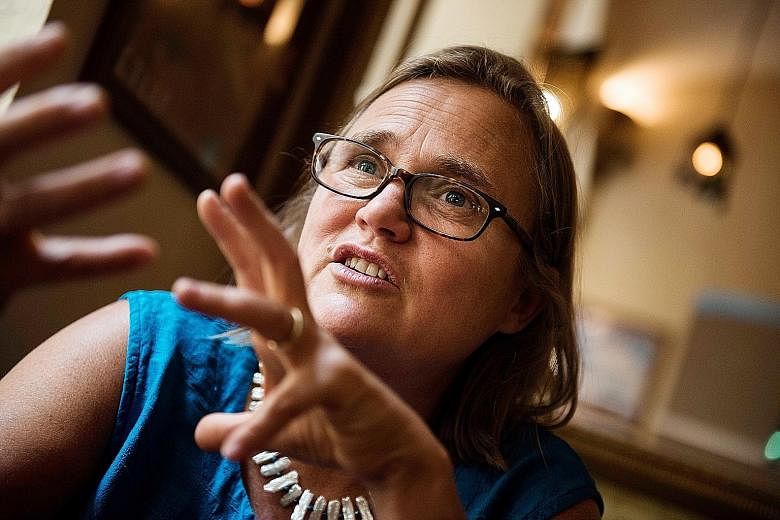Social entrepreneur Julia Middleton wishes she could transplant Singapore's hawker centres to London, where she lives.
Mrs Middleton, the 57-year-old founder and chief executive of international charity Common Purpose, says: "The centres are so much a part of your DNA that you don't even recognise they are extraordinary communal spaces in the city."
She especially likes the fact that such spaces enable people to enjoy decent, inexpensive food together "under one roof buzzing with energy", as she saw on a recent trip here. Such surroundings, she adds, help a city thrive by encouraging everyone to mingle such that they feel they belong in the city.
The Briton runs her Common Purpose leadership programmes in cities, persuading her participants from all walks of life that they would run their workplaces or communities better if they understood better what, why and how they are working for the good of everyone in their city.
Those in her programmes range from secondary school students to top leaders, and her office in Singapore got 100 students here on Oct 13 to delve into and discuss, the legacy of SG50.
"Many people say there are so many disagreements within a city, but I see less of that and more of people just not talking to one another," she says. "That kind of laziness usually means you carry your problems around rather than deal with them."

The way forward, then, is to encourage everyone to have "uncomfortable conversations", or chats which are awkward, either because they are on subjects which one has differences of opinions with others or one has to chat with people who are different from you.
That is all very well, but how do you work well with those whom you would not ordinarily befriend?
Mrs Middleton uses the concept of Core and Flex, which is explained in her 2014 book, Cultural Intelligence.
Core refers to what you value most, including certain behaviour and principles such as "be loyal to your siblings". Flex, then, refers to the compromises you are willing to make to accommodate the needs and wants of others. She calls any prejudices you have against others "knots in your core".
For example, she gives anyone she meets her full attention to show her commitment because that is core to her. As looking another person straight in the eye can seem "intrusive" in some cultures, she flexes by doing so and then looking down quickly. Flex, however, "is not about being someone you're not", she stresses.
The surer you are of what lies at your core, she adds, the better able you would be to flex during uncomfortable conversations.
"If the rope tied to your boat's anchor is too tight, it will keep bumping into the dock when there are waves and it will break eventually," she notes. "But if your anchor has a long enough piece of rope, that boat will flow with the waves and be fine."
She says being "quite dyslexic" shaped her philosophy on bridging differences in society. She could read and write properly only from the age of 10 and left school at 19. So for the first seven years of her life, she says, she became inured to failure, which built her resilience.
"Once you've failed a lot, failure no longer worries you as much."
That is why she has nudged her five children to try new things so they can "practise failing, getting up and keeping going" because, as she puts it, "the truth is, an enormous amount of life is failure".
Even when they were in school, she "would never make decisions for them" but instead ask them difficult questions that would help them make better decisions.
Her eldest son John is general manager of London cancer hospital the Royal Marsden NHS Foundation Trust; eldest daughter Emma works on policy for chicken chain Nando's; another daughter Kate - whose Facebook account keeps crashing because people mistake it for that of the Duchess of Cambridge - is a teacher; youngest daughter Rachel has just left university and youngest son Tom is about to enter it. Her husband Rupert Middleton is chief operating officer of banknote printer De La Rue.
Her trader father's work also took her family to melting-pot cities such as New York, where she attended state schools in which she had "very little experience of being in a majority".
But the late bloomer did well at the London School of Economics and, among other things, went on to train people to understand financial information before setting up Common Purpose in 1989.
While she has not lacked opportunities because she is a woman, she champions greater opportunities for women because "it is unbelievable what most women have to go through".
Half of the participants in Common Purpose's leadership programmes are women.
She muses: "My father used to say don't stand up because you want applause because it's very unlikely to happen. You stand up because it's the right thing to do."
•Cultural Intelligence: CQ: The Competitive Edge For Leaders Crossing Borders by Julia Middleton is available on order for $70.39 from Books Kinokuniya, or on loan from the National Library Board under the call number English 658.408 MID-[BIZ]


